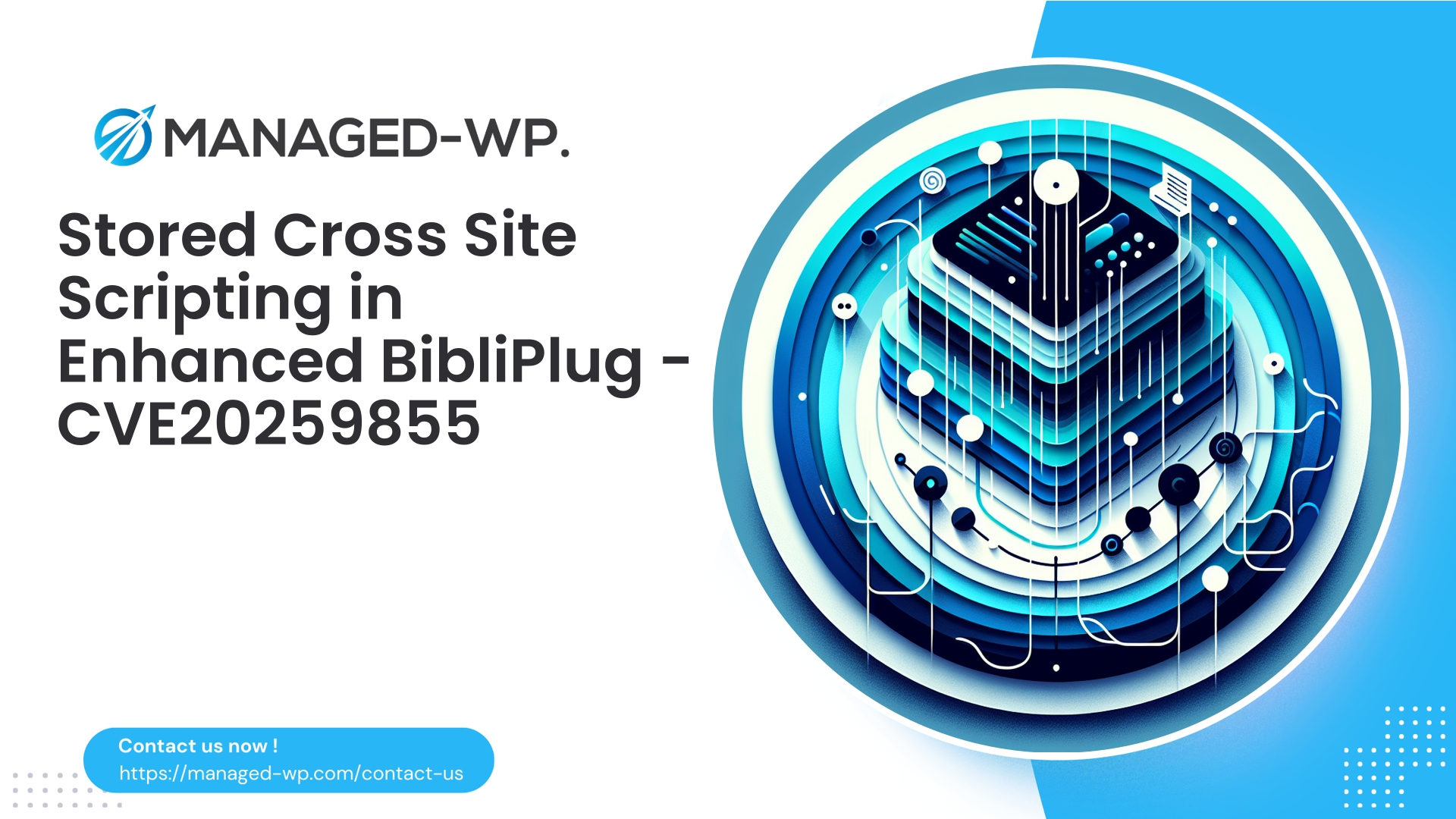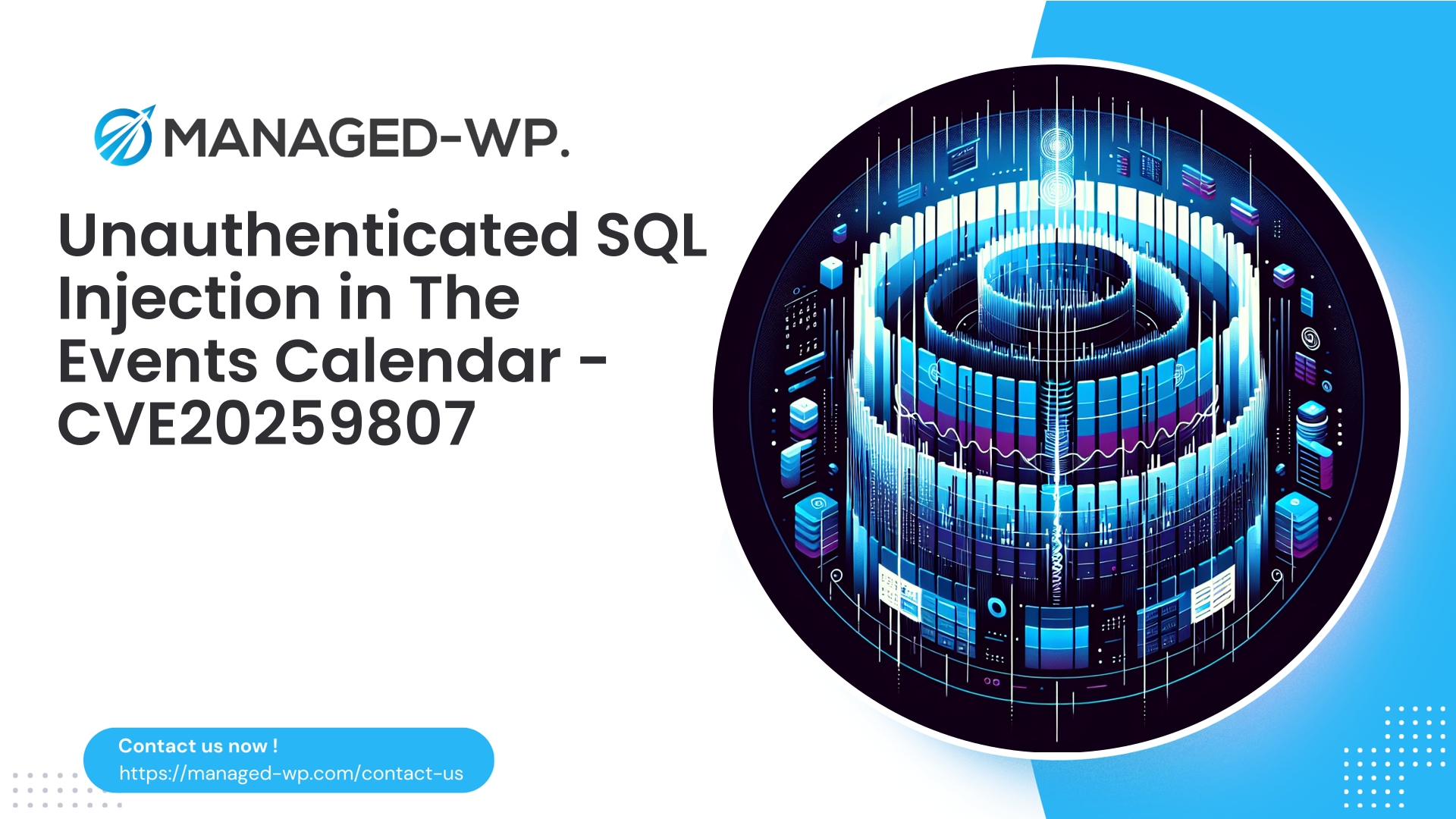| 插件名稱 | 增強型 BibliPlug |
|---|---|
| 漏洞類型 | 儲存型XSS |
| CVE編號 | CVE-2025-9855 |
| 緊急 | 低的 |
| CVE 發布日期 | 2025-09-11 |
| 來源網址 | CVE-2025-9855 |
緊急通知:增強版 BibliPlug (<=1.3.8) 貢獻者身分驗證儲存型 XSS 攻擊 – 風險、偵測以及 Managed-WP 如何保護您的網站
作者:Managed-WP 安全團隊
日期:2025年9月11日
執行摘要
Enhanced BibliPlug WordPress 外掛程式中發現了一個儲存型跨站腳本 (XSS) 漏洞,影響所有版本,包括 1.3.8 及更早版本,漏洞編號為 CVE-2025-9855。此安全漏洞允許具有貢獻者等級存取權限的已認證使用者嵌入持久性 HTML 或 JavaScript 程式碼,這些程式碼會在受影響內容載入時執行,從而帶來會話劫持、權限提升和程式碼注入等重大風險。
本文全面分析了此漏洞、實際攻擊途徑、可靠的偵測方法以及切實可行的緩解措施。此外,本文還重點介紹了 Managed-WP 如何在等待官方修復程序發布期間提供即時虛擬補丁和保護。
網站所有者為何需要立即採取行動
- 貢獻者角色在多作者部落格、教育平台和社群網站上很常見——這些用戶提交內容,但並不完全受信任。
- 這種儲存型 XSS 攻擊尤其危險,因為惡意腳本會一直存在於網站上,在頁面載入時執行,並影響所有訪客和具有較高權限的使用者。
- 即使貢獻者沒有管理員權限,攻擊者也可以利用此漏洞,透過在編輯和管理員將要查看的內容中註入惡意程式碼來攻擊他們,從而實現會話竊取或帳戶接管。
- 截至本公告發布之日,尚無官方修補程式可用,因此,採取緊急防禦策略(包括監控、角色強化和虛擬修補)對於降低風險至關重要。
技術細節
- 外掛:適用於 WordPress 的增強型 BibliPlug
- 受影響版本:1.3.8 及以下
- 漏洞:儲存型跨站腳本攻擊(儲存型 XSS)— OWASP A7
- 所需存取權限:已認證的貢獻者等級用戶
- 已分配的 CVE 編號:CVE-2025-9855
- CVSS 評分:6.5(中度風險,視具體情況而定)
- 目前狀態:截至發稿時,尚未發布官方補丁。
此漏洞源自於插件資料欄位中輸入驗證和輸出轉義不足。貢獻者提交的未經清理的 HTML 和 JavaScript 程式碼可能會持久存在於資料庫中,並在前端頁面、管理面板或 AJAX 回應中渲染時執行。
攻擊者可能如何利用此漏洞
- 擁有貢獻者帳戶的攻擊者會在書目條目(例如標題、作者、URL 或註釋)中嵌入惡意腳本。這些腳本會在任何檢視內容的使用者瀏覽器中執行,包括管理員。
- 注入的腳本可以隱藏在管理小部件或內容審核儀表板中,從而暴露編輯和管理員的會話 cookie 或身份驗證令牌。
- XSS 可以與 CSRF 或其他漏洞結合使用,以執行未經授權的管理操作,例如變更網站設定、建立帳戶或更新外掛程式。
- 攻擊者可能會利用此途徑注入隱蔽重定向、惡意下載、加密貨幣挖礦腳本或社會工程內容(虛假登入表單)來竊取使用者憑證。
筆記: 雖然利用漏洞需要經過身份驗證的貢獻者存取權限,但在開放註冊的網站上,建立此類帳戶通常只需極少的障礙。
偵測:安全地識別入侵跡象
使用增強型 BibliPlug 的網站管理員應立即調查是否有被攻擊的跡象。這些方法安全可靠,無需執行惡意程式碼。
- 搜尋插件內容和元數據,尋找可疑的 HTML 或
標籤。
SQL 查詢範例(在受控環境中執行):-- 搜尋文章和元資料中是否存在可疑腳本內容 SELECT ID, post_title FROM wp_posts WHERE post_content LIKE '%'
- 審核所有外掛程式特定的資料庫表格和選項,尋找嵌入腳本或可疑欄位。
- 審核投稿用戶最近提交的內容,優先考慮最近新增或修改的內容。
- 分析伺服器和應用程式日誌,在尋找相同內容的 GET 請求之前,向插件端點發出的異常 POST 請求。
- 使用瀏覽器開發者工具檢查頁面是否有意外的內聯事件處理程序或註入的腳本標籤。
- 運行信譽良好的惡意軟體掃描程序,並檢查 WAF 日誌,尋找腳本注入或修改嘗試的跡象。
立即採取的緩解措施
如果無法立即更新插件,請部署這些多層防禦措施來降低風險。
- 暫時限製或停用貢獻者帳號:
——阻止新用戶註冊,
將貢獻者角色調整為權限較受限的角色,
- 發布前需管理員審核。 - 對主題模板中的輸出進行清理:
- 實施esc_html(),esc_attr(), 和wp_kses_post()此處顯示插件數據,以避免不安全的 HTML 渲染。 - 部署 Web 應用程式防火牆 (WAF) 規則,阻止包含可疑模式的輸入:
– 過濾包含以下內容的插件 REST 端點的 POST/PUT 請求<script,javascript:以及類似這樣的事件處理程序錯誤=,onload=, 或者滑鼠懸停=. - 透過 IP 位址白名單或受信任網路限制,限制管理員和編輯對受影響外掛程式資料頁面的存取權限。
- 強化會話 cookie:
– 應用 Secure、HttpOnly 和 SameSite 標誌,
對敏感操作強制執行重新身份驗證。 - 實施嚴格的內容安全策略 (CSP) 以防止內聯腳本執行:
- 例:Content-Security-Policy: default-src 'self'; script-src 'self' 'nonce-...'; object-src 'none'; frame-ancestors 'none';
託管式WP保護:虛擬修補程式和進階防禦
Managed-WP 提供全面的安全回應,以保護您的 WordPress 網站免受 CVE-2025-9855 帶來的攻擊風險:
- 客製化的 WAF 簽章能夠立即偵測並阻止將惡意腳本注入增強型 BibliPlug 端點的嘗試,並經過調整以最大限度地減少誤報。
- 行為分析將內容提交和存取模式關聯起來,以標記可疑活動。
- 虛擬修補程式可以立即部署到您的整個網站網絡,無需等待官方插件修補程式。
- 即時監控和警報功能使管理員能夠及時了解被阻止的攻擊嘗試和潛在的安全漏洞。
- 事件回應支援指導在偵測到入侵時進行清理、補救和憑證輪替。
如果您還沒有使用 Managed-WP,請考慮啟用我們的免費基礎計劃,以獲得基本的防火牆保護和快速虛擬補丁,從而立即緩解威脅。
針對防禦者的WAF規則範例(概念性)
以下是一些用於阻止針對插件欄位的常見 XSS 注入攻擊的 WAF 模式範例:
- 封鎖包含內嵌腳本標籤或可疑事件處理程序的 POST 請求體:
– 模式(不區分大小寫):(?i)<\s*script\b|javascript:|onerror=|onload=|onmouseover=
– 操作:當偵測到針對外掛相關端點的攻擊時,予以阻止或質疑。 - 標記並質疑可疑的 base64 有效載荷以及解碼後的 HTML 指標。
- 限制對管理外掛端點的訪問,僅允許經過身份驗證的編輯/管理員和已知的 IP 位址範圍存取。
重要的: 請務必在測試環境中調整和測試 WAF 規則,以防止阻止合法流量。
面向插件開發者的安全編碼建議
插件維護者應遵循安全編碼最佳實踐,以降低 XSS 風險:
- 對所有輸入進行清理:
- 使用sanitize_text_field()純文字;
- 使用wp_kses()必要時可使用允許的 HTML 標籤白名單。 - 轉義所有輸出:
- 申請esc_html(),esc_attr(), 和wp_kses_post()在渲染點。 - 使用隨機數字和能力檢查來驗證表單提交和請求。
- 驗證並規範化資料類型(例如,URL)。
esc_url_raw()(數字轉換為整數)。 - 儲存前先將儲存的元資料元素清理。
- 避免在管理員通知或元框中回顯未經轉義的使用者輸入。
- 加入自動化測試,以驗證消毒效果和規避執法。
長期場地加固檢查清單
- 審核所有已安裝插件的輸入驗證和輸出轉義情況。
- 謹慎管理和限制用戶註冊;強制執行帳戶審核。
- 嚴格執行密碼策略並定期輪換密碼。
- 對管理員和編輯帳戶實施多因素身份驗證 (MFA)。
- 使用審核佇列來審核低信任度使用者角色提交的內容。
- 保持 WordPress 核心、外掛和主題的更新,並訂閱可信任的漏洞資訊來源。
- 部署檔案完整性監控和異地備份,以確保可復原性。
- 對主機和伺服器存取權應用最小權限原則。
- 配置並維護一套適合您環境的強大內容安全策略。
- 啟用必要的 HTTP 安全標頭,例如 Strict-Transport-Security、X-Frame-Options、X-Content-Type-Options 和 Referrer-Policy。
事件回應工作流程
- 控制事態發展:
– 停用或停用存在漏洞的插件,
– 啟用維護模式或限制對受影響頁面的公開存取。 - 建立取證快照:
– 備份整個網站檔案和資料庫;
– 保存相關的伺服器和 WAF 日誌(時間戳記、IP 位址、用戶代理、有效負載)。 - 移除惡意注入:
– 清理或取代資料庫中受損的內容條目;
– 掃描是否有 Web Shell 或未經授權的文件變更。 - 輪換憑證:
– 重設管理員、編輯和投稿人帳號的密碼;
– 更新金鑰、令牌和 API 憑證。 - 恢復清潔的環境:
– 必要時使用已知有效的備份;
– 從可信任來源重新安裝外掛程式。 - 採取加固措施並監控日誌,以發現反覆出現的威脅。
- 依照規定,與利害關係人和受影響使用者進行透明溝通。
- 記錄整個事件過程,從中吸取教訓,並據此更新安全性策略。
投稿者和審稿人指南
- 投稿者請注意:請勿在提交欄位中貼上不受信任的HTML或JavaScript程式碼。請以純文字格式提供內容,以便編輯進行格式化。
- 審查者/編輯:審核前請對內容進行清理;安全預覽內容,避免在管理區域執行有害程式碼。
- 所有使用者:請回報管理過程中出現的異常行為,例如意外彈出視窗、模態對話方塊或登入提示。
常見問題 (FAQ)
Q:無需身份驗證即可利用此漏洞嗎?
答:不。攻擊者必須擁有貢獻者等級的存取權限;但是,在允許公開註冊的網站上建立此類帳戶可能很容易。
Q:這是否會影響未使用增強型 BibliPlug 的網站?
答:不。只有經營受影響版本外掛的網站才會面臨風險。
Q:WAF 會阻止插件的正常功能嗎?
答:配置不當的WAF規則可能會導致誤報。 Managed-WP的規則經過精心設計,可最大限度地減少干擾並提供白名單選項。
Q:我應該立即卸載該插件嗎?
答:如果無法採取緩解措施且該外掛程式並非必不可少,則暫時停用可降低風險。否則,請啟用 WAF 保護並限制貢獻者操作。
披露和補丁時間表
負責任的更新揭露時間表允許供應商開發和測試補丁。然而,網站所有者並非總是能等待。虛擬補丁、增強監控和角色加固是至關重要的過渡措施。請監控插件更新並及時套用補丁。如果供應商沒有回應,請考慮遷移到更安全的替代方案。
建議的行政補救措施
- 完成網站完整備份(資料庫和檔案)。
- 將網站置於維護模式或透過 IP 位址限制管理員存取權限。
- 使用提供的 SQL 查詢掃描資料庫,尋找注入的腳本。
- 手動刪除或清理可疑資料條目。
- 重置所有管理員和編輯的密碼;強制註銷所有會話。
- 啟動 Managed-WP 虛擬補丁規則以阻止進一步的注入嘗試。
- 密切監控日誌,以防再次感染或後續攻擊。
- 當官方插件更新發佈時,請先在測試環境進行測試和部署,然後再部署到生產環境。
立即建議
- 若已安裝增強型 BibliPlug,請立即採取行動;立即調配資源解決此漏洞。
- 盡可能限制貢獻者角色,並強制執行內容審核。
- 實施帶有虛擬補丁的 WAF,以減少風險,直到廠商發布補丁為止。
- 作為長期防禦措施,在主題和外掛層級對外掛程式資料的所有輸出進行清理和轉義。
立即保護您的網站—從 Managed-WP Basic(免費)開始
立即為您的 WordPress 網站取得免費的 WAF 保護
Managed-WP Basic 提供即時保護,無需等待外掛程式更新。我們的免費方案包含託管防火牆、無限頻寬、針對 CMS 特定威脅自訂的應用程式級 WAF 規則、惡意軟體掃描以及針對 OWASP Top 10 風險的防禦。這可實現快速虛擬修補,從而縮小攻擊面並提高對攻擊嘗試的可見性。
在此註冊並啟動保護: https://my.wp-firewall.com/buy/wp-firewall-free-plan/
我們提供升級選項,以增強惡意軟體清除、存取控制、定期報告和優先虛擬修補程式支援。
Managed-WP 的結語
儲存型跨站腳本攻擊(XSS)漏洞,例如 CVE-2025-9855,由於其隱藏性和身份驗證特性,仍然是一個持續存在的威脅。貢獻者提交內容的能力,加上輸出轉義不足,構成了一個嚴重的攻擊途徑。最佳防禦策略是分層防禦:降低權限、清理輸入、轉義輸出,並部署託管式 Web 應用防火牆 (WAF),在官方修復程式發布之前提供虛擬修補程式。
Managed-WP 的專家團隊隨時準備為您提供漏洞評估、WAF 調優、清理和復原支援。立即保護您的 WordPress 網站,透過快速有效的虛擬修補程式和策略控制,在攻擊初期就將其扼殺在萌芽狀態。
參考文獻及延伸閱讀
如需客製化支援和漏洞排查,請聯絡 Managed-WP 並提供您的 WordPress 環境和設定的詳細資訊。



















